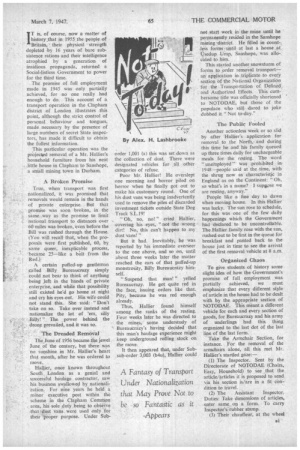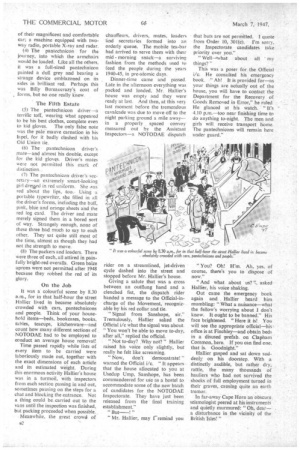By Alex. H. Lashbrooke I T is, of course, now a
Page 35

Page 36

If you've noticed an error in this article please click here to report it so we can fix it.
matter of history,that in 1955 the people of Britain, . their physical strength depleted by 16 years of bare subsistence rations and their intelligence atrophied by a generation of insidious propaganda, returned a Social-listless Government to power for the third time.
The promise of full employment made in 1945 was only partially achieved, for no one really had enough to do. This account of a transport operation in the Clapham district of London illustrates this point, although the strict control of personal behaviour and tongues, made necessary by the presence of large numbers of secret State inspectors, has made it difficult to obtain the fullest information.
This particular operation was the .. projected removal of a Mr. Hallier's household furniture from his neat little house in Clapham to Sanshope, a small mining town in Durham.
A Broken Promise True, when transport was first nationalized, it was promised that removals would remain in the hands of private enterprise. But that promise was soon broken, in the same way as the promise to limit national transport to distances over 60 miles was broken, even before the Bill was rushed through the House. (You will recall that, when the proposals were first published, 60, by some queer, inexplicable process, became 25—like a bolt from the R ed.).
A certain puffed-up gentleman called Billy Bureaucrazy simply could not bear to think of anything being left in the hands of private enterprise, and while that possibility still existed he'd go home at night and cry his eyes out. His wife could not stand this. She said: " Don't take on so. Take over instead and nationalize the lot of 'em, silly Billy!" The power behind the drone prevailed, and it was so.
The Dreaded Removal
The,June of 1956 became the jewel June of the century, but there was no sunshine in Mr. Hallier's heart that month, after he was ordered to move..
Haller, once known throughout South London as a genial and successful haulage contractor, saw his business swallowed by nationalization. For nine years he held a minor executive post within the scheme in the Clapham Common area, his sole duty being to observe that dust vans . were used only for their proper purpose. Under Sub order 1,001 (a) this was set down as the collection of dust. There were designated vehicles for ,all other categories of refuse.
Poor Mr. Haler! He overslept one morning and horror piled on horror when he finally got out to make his customary round. One of his dust vans was being inadvertently used to remove the piles of discarded investment tickets outside State Dog Track 5.1-.19!
"Oh, no, no! " cried Hallier, covering his eyes, `.` not the wrong dirt! No, this can't happen to my dust vans! "
But it had. Inevitably, he was reported by his immediate overseer to the one above, and so on, until about three weeks later the matter reached the ears of that puffed-up monstrosity, Billy Bureaucrazy himself.
Suspend that man!" yelled Bureaucrazy. He got quite red in the face, issuing orders like that. Pity, because he was red enough already.
Thus, Hallier found himself among the ranks of the resting. Four weeks later he was directed to the mines, some understudy of Bureaticrazy's having decided that this man's haulage experience might keep underground rolling stock on the move.
It then appeared that, under Subsub-order 3,003 (b4u), Hallier could
not start work in' the, mine until he permanently resided in the Sanshope mining -district. He filled in countless forms' until at last a house at Usedup lJmp, Sanshope, was allocated to him.
This started another snowstorm of forms to order removal transport— an application in triplicate to every section of the National Organization for the Transportation of Defined and Authorized Effects. This cumbersome title was officially shortened to NOTODAE, but those of the populace who stilt dared to joke dubbed it " Not to-day."
The Public Fooled Another actionless week or so slid by after Hallier's application for removal to the North, and during this time he and his family queued up three times daily for unchargea.ble meals for the resting. The word " unemployed' was •prohibited
1948—people said at the time, with the shrug now as characteristjc in England as on the Continent: "Oh, so what's in a name? I supiiose we are resting, anyway."
People like a fine day to dawn when moving house. In this Hallier was lucky. The sun rose to schedule, for this was one of the few daily happenings which the Government had declared to be uncontrollable. The Hallier family rose with the sun, rushed out to be first in the queue for breakfast and panted back to the house just in time to see the arrival of the first removal vehicle at 8 a.m.
Organized Chaos
To give students of history some slight idea of how the Government's promise of full employment was partially achieved, we must emphasize that every different style of article in the house had to be dealt with by the appropriate section of NOTODAE. This meant a different vehicle for each and every section of goods, for Bureaucrazy and his army of underlings had this thing organized to the last dot of the last line of the last form.
Take the Armchair Section, for instance. For the removal of the armchairs alone, all this met Mr. Hallier's startled gaze:—
(1) The Inspector. Sent by the Directorate of NOTODAE (Chairs, Easy, Household) to see that the article/articles it is proposed to send via his section is/are in a fit condition to travel.
(2) The Assistant Inspector. Duties: Take dimensions of articles, enter same on a form. To carry Inspector's rubber stamp.
(3) Their chauffeur, at the wheel at '
of their magnificent and comfortable car: a machine equipped with twoway radio, portable X-ray and radar.
(4) The pantechnicon for the journey, into which the armchairs would be loaded. Like all the others. it was a full-sized pantechnicon painted a dull grey and bearing a strange device emblazoned on its sides in brilliant red. Perhaps this was Billy Bureaucrazy's coat of forms, but no one really knew.
The Filth Estate
(5) The pantechnicon driver—a terrific toff, wearing what appeared to be his best clothes, complete even to kid gloves. The only false note was the pale mauve carnation in his lapel, for it badly clashed with his Old Union tie.
(6) The pantechnicon driver's mate—and almost his double, except for the kid gloves. Driver's mates were not permitted this mark of distinction.
(7) The pantechnicon driver's-sec retary—an extremely smart-looking girl drelied in red uniform. She was red about the lips, too. Using a. portable typewriter, she filled in all the driver's forms, including the buff, pink, blue and orange sheets and the red log card. The driver and matemerely signed them in a bored sort of way. Strangely enough, none of these three had much to say to each other. They sat quite still Most of the time, almost as though they had not the strength to move.
(8) The packers and loaders. There were three of each, all attired in painfully bright-red overalls, Green bake aprons were not permitted after 1948 because they robbed the red of its glory.
On the Job It was a colourful scene by 8.30 a.m., for in that half-hour the street Hallier lived in became absolutely crowded with cars, pantechnicons and people. Think of your household items—beds, bookcases, books. tables, teacups, kitchenware—and count how many different sections of NOTODAE had to be employed to conduct an average house removal!
Time passed rapidly while lists of every item to be carried were laboriously made out, together with the exact dimensions of each article and its estimated weight. During this enormous activity Hallier's house was in a turmoil, with inspectors from each section passing in and out, sometimes pausing on the steps for a chat and blocking the entrance. Not a thing could be carried out to the vans until the inspection was finished, but packing proceeded when possible.
Meanwhile, the great crowd of chauffeurs, drivers, mates, loaders and secretaries formed into an orderly queue. The mobile tea-bar had arrived to serve them with their mid morning snack—a surviving fashion from the methods used to feed the people during the years 1940-45, in pre-atomic days.
Dinner-time came and passed. Late in the afternoon everything was packed and loaded. Mr. Hallier's house was empty and they were ready at last. And then, at this ver3, last moment before the tremendous cavalcade was due to move off to the night parking ground a mile away— in a properly spaced convoy measured out by the Assistant Inspectors—a NOTODAE dispatch
rider on a streamlined, jet-driven cycle dashed into the street and stopped before Mr. Hallier's house.
Giving a salute that was a cross between an outflung hand and a clenched fist, the dispatch rider handed a message to the Official-incharge of the Movement, recognizable by his red collar and tie.
"Signal from Sanshope, sir." Tremulously, Hallier asked the Official i/c what the signal was about. "You won't be able to move to-day, after all," replied the official.
"Not to-day? Why not?" Hallier raised his voice only slightly, but really he felt like screaming.
"Now, don't demonstrate!" warned the Official i/c. "It appears that the house allocated to you at Usedup Unap, Sanshope, has been commandeered for use as a hostel to accommodate some of the new batch of candidates for the NOTODAE Inspectorate. They have just been released from the final training establishment."
"But—! "
"Mr. Hallier, may rremind you that buts are not permitted. I quote from Order. 10, 301(c). I'm sorry, the Inspectorate candidates take priority over you."
"Well—'what about all ' my things?
This was a poser for the Official i/c. He consulted his emergency book. " Ah! It is provided for—as your things are actually out of the house, you will have to contact the Department for the Recovery of Goods Removed in Error," he ruled He glanced at his watch. "It's 4.10 p.m.—too near finishing time to do anything to-night. The men and girls will receive transport home. The pantechnicons will remain here under guard."
"You? Oh! H'm. Ah, yes, of course, there's you to dispose of now."
"And what about us? asked Haller, his voice shaking.
Out came the emergency book again and Hallier heard hint mumbling: "What a nuisance—what the fellow's worrying about I don't know. It ought to be banned." His face brightened. "Here it is! You will see the appropriate official—his % office is at Finchley—and obtain beds in a disused prefab. on Clapham Common, here. If you can find one. that is. Goodnight."
Hallier gasped and sat down suddenly on his doorstep. With a distinctly audible, but rather dry, rattle, the many thousands of hauliers who had not survived the shocks of full employment turned in their graves, causing quite an earth tremor.
In far-away Cape Horn an obscure seismologist peered at his instruments and quietly murmured: "Oh,. dear— . a disturbance in the vicinity of the British Isles! "












































































